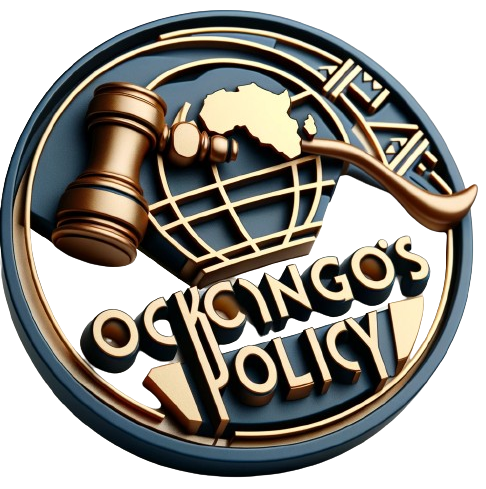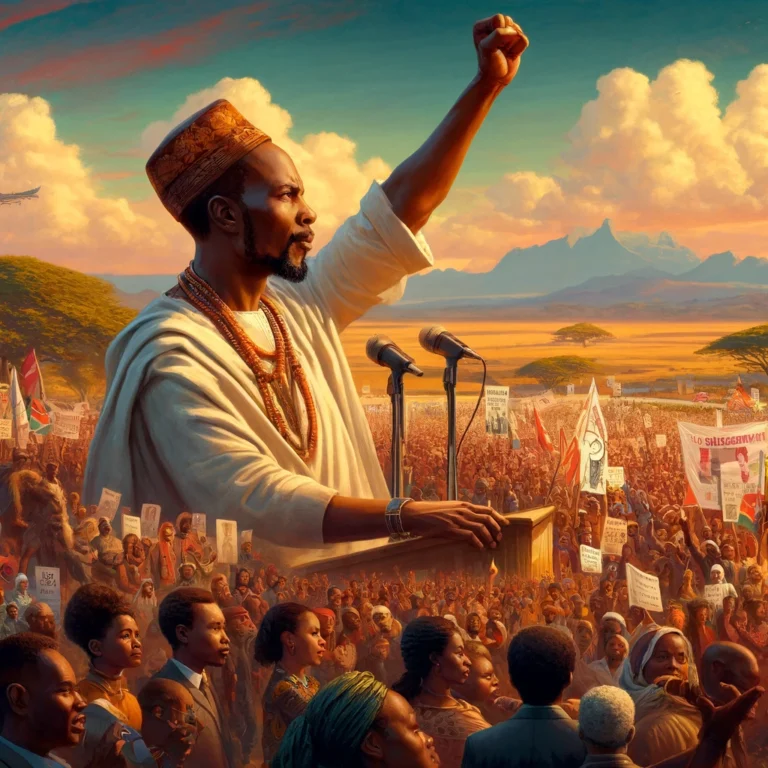African Policy Analysis
The weaving of environmental concerns into the very fabric of policy frameworks has surged in importance, a critical cornerstone for sustainable development across Africa. Policymakers, now acutely aware, are waking up to the stark realities: biodiversity is vanishing at an alarming rate, water resources are dwindling with every passing year, and land—oh that precious land—is degrading right before our eyes. These looming threats don’t merely put natural resources on the chopping block; they also shake the foundations of food security and snatch away livelihood opportunities from millions throughout this vast continent.
Crafting effective environmental policies holds promise—a beacon that can bolster resilience against climate change while paving avenues for sustainable economic growth. It’s not just advisable; it’s essential! We must elevate these considerations to their rightful place atop the policymaking hierarchy.
But wait! There’s more to this narrative: engaging local communities and stakeholders isn’t just a box to tick off; it’s absolutely crucial for breathing life into environmental policies. When we weave traditional knowledge and practices into our strategies, policymakers can create initiatives that resonate with the lived experiences and ecological necessities of those on the ground. Embracing participatory approaches cultivates ownership within communities—a vital ingredient for successful conservation efforts.
As Africa wrestles with relentless challenges posed by climate change and rampant environmental degradation, intertwining these vital considerations into every nook and cranny of policymaking will be indispensable—not only for long-term sustainability but also for securing regional stability amid turbulent times ahead.
Sustainable Practices and Climate Change Response
Integrating sustainable practices into the very fabric of policy-making is absolutely vital for tackling the multifaceted challenges that climate change throws at Africa. Picture this: innovative strategies like agroecology and renewable energy initiatives are not just buzzwords; they represent a paradigm shift aimed at cutting our reliance on fossil fuels while simultaneously boosting food security and nurturing environmental health. Policymakers, increasingly aware of the stakes, are leaning toward adaptive strategies that build resilience in communities most vulnerable to the whims of climate variability.
Now, consider this—adopting these forward-thinking sustainable methods doesn’t merely serve ecological preservation; it opens up a treasure trove of opportunities for economic expansion and job creation within burgeoning green sectors. Investment in renewable energy sources—think solar and wind—is pivotal during this transformative journey. By tapping into nature’s abundant resources, nations can combat climate change’s wrath while slashing greenhouse gas emissions.
But wait! It doesn’t stop there; supportive legal frameworks and enticing incentives become crucial players in rallying private sector engagement with these sustainable projects. Collaboration with local communities isn’t just an afterthought—it’s essential to ensure initiatives resonate with regional needs, cultivating ownership among locals and significantly upping the odds for lasting success. In essence, these collective efforts forge a formidable response to climate change—a dual win that enhances both environmental integrity and economic sustainability across the continent!
| Sustainable Practice | Description | Benefits |
|---|---|---|
| Agroecology | A farming approach that combines ecology with agricultural practices to enhance biodiversity and resilience. | Improves food security and soil health. |
| Renewable Energy Initiatives | Programs focused on harnessing renewable energy sources like solar and wind to generate power. | Reduces reliance on fossil fuels and lowers greenhouse gas emissions. |
| Legal Frameworks for Sustainability | Policies and regulations designed to support and promote sustainable development. | Encourages private investment and compliance with environmental standards. |
| Community Engagement | Involving local populations in the planning and implementation of sustainable projects. | Fosters a sense of ownership and increases the likelihood of project success. |
The Role of International Organizations
International organizations wield significant clout in sculpting and bolstering policies across the diverse landscape of African nations. They’re not just providers of cash; they bring vital expertise, essential frameworks—tools that propel development initiatives and tackle urgent social, economic, and environmental conundrums. Imagine these entities as catalysts for collaboration among member states—sparking partnerships that can morph into effective governance and smarter resource allocation. Their impact ripples through sectors like health, education, infrastructure—highlighting an undeniable truth: sustained engagement with local governments is a must.
Now, consider this: when African nations join forces with international bodies, the potential to bolster regional stability and champion sustainable practices expands exponentially. This synergy allows countries to swap best practices like trading cards; it’s about leveraging technology while crafting policy frameworks that resonate with global standards yet cater to local realities. Moreover, these partnerships serve to empower African governments—not merely participants but champions of their own initiatives—ensuring policies are culturally attuned and flexible enough for specific contexts. Strengthening these connections isn’t just beneficial; it’s pivotal for building resilience against future storms on the horizon.
Collaboration Between Africa and Global Entities
Forging robust partnerships between African nations and international organizations is not just beneficial; it’s imperative for tackling the continent’s intricate array of challenges. Picture this: collaborative endeavors that do more than just pool resources—they ignite a symphony of technical know-how and financial backing. These alliances pave the way for initiatives aimed squarely at pressing issues like poverty alleviation, healthcare enhancements, and strides in education. By harnessing the unique strengths of global players, African countries can roll out sustainable strategies that catalyze economic growth and foster development.
But wait, there’s more! The engagement of international entities doesn’t merely enhance support; it amplifies Africa’s voice on the world stage with unprecedented clarity. This partnership sparks active participation from African nations in crucial dialogues surrounding climate change, trade policies, and security frameworks—topics that are too often overshadowed by larger powers. Building networks among an eclectic mix of stakeholders—from governmental to non-governmental organizations—creates fertile ground for sharing knowledge and implementing best practices. It’s within these vibrant exchanges that African leaders find empowerment as they navigate their paths toward sustainable development and enduring stability in an ever-evolving landscape.
- Strengthening local capacities through knowledge sharing and skill development.
- Increasing access to funding and investment opportunities for African projects.
- Promoting innovative solutions tailored to Africa’s unique challenges.
- Enhancing regional cooperation and integration through collaborative initiatives.
- Amplifying Africa’s influence in global policy discussions and decision-making processes.
- Building resilience against global challenges like climate change and economic shocks.
- Fostering cultural exchanges that enrich mutual understanding and relationships.
Security Policies and Regional Stability
Regional stability in Africa stands as a linchpin for robust security policies—an intricate puzzle where many nations grapple with relentless trials: the specters of armed conflict, terrorism lurking in the shadows, and the insidious grip of organized crime. A one-size-fits-all approach simply won’t cut it; instead, we must embrace a nuanced strategy that respects and reflects each nation’s distinct sociopolitical tapestry. This means weaving local communities into the very fabric of security initiatives—fostering trust like a delicate thread binding diverse pieces together.
Collaboration is key; neighboring states can join forces to bolster defenses against transnational threats—think shared intelligence flowing across borders, resources pooling like rivers converging after heavy rain. Establishing comprehensive strategies for conflict resolution transforms this landscape further. Engagement through dialogue and mediation acts as a balm on simmering tensions before they erupt into chaos—a preemptive strike against violence itself.
Moreover, pouring investments into economic development and education lays down solid groundwork for enduring stability. These efforts don’t merely patch up wounds; they build resilience against instability arising from inequality or disenfranchisement’s cold grasp. Prioritizing these multifaceted strategies doesn’t just safeguard national interests—it nurtures regional harmony too, creating an intricate web of interconnectedness vital to thriving amidst adversity.
Strategies for Conflict Resolution
Navigating the intricate labyrinth of conflict resolution in Africa demands a tapestry woven from diverse threads, each one reflective of the distinct political and cultural landscapes that vary across its vast regions. At the heart of this endeavor lies the engagement of local stakeholders—a fundamental step toward fostering genuine understanding and cooperation amidst discordant factions. Picture dialogue-driven initiatives as vibrant seeds planted in fertile ground; they blossom into sustainable peace by nurturing inclusive conversations that delve deep into the root causes of strife.
But here’s where it gets fascinating: blending traditional conflict resolution techniques with contemporary practices can amplify trust and pave pathways to reconciliation among communities often fraught with tension. It’s like mixing age-old wisdom with modern ingenuity—creating an alchemical process for healing.
Regional organizations emerge as pivotal players in this complex arena, acting not just as facilitators but also as architects of negotiation platforms that encourage shared insights on pressing issues. When strategically deployed, peacekeeping missions can serve as stabilizing forces within tumultuous regions—but their efficacy hinges significantly on the unwavering commitment from member states and local populations alike.
Moreover, envisioning early warning systems adds another layer to this intricate puzzle, enabling preemptive strikes against potential conflicts through timely interventions—an approach promising long-term stability amid chaos. In such a fluid landscape, every element intertwines uniquely to form solutions tailored specifically for Africa’s multifaceted challenges.
The Influence of Technology on Policy
The infusion of technology into the realm of policy-making in Africa is not just important; it’s becoming a necessity, a pulse that quickens with each passing day. Governments are diving headfirst into the digital ocean, harnessing tools that elevate transparency and breathe new life into citizen engagement. Picture innovative platforms springing forth like vibrant flowers after rain—each one opening doors to information and inviting real-time feedback from an eager public. This kind of engagement doesn’t just happen; it ignites a spark for participatory governance, transforming citizens from passive observers to active contributors shaping the very decisions that carve out their lives.
But wait—there’s more! Data analytics emerge as the unsung heroes in this narrative, wielding power to illuminate trends and dissect existing policies with surgical precision. Leaders can now navigate through complex layers of information, making choices grounded in insights rather than mere intuition.
Now let’s talk about digital transformation—a whirlwind reshaping governmental operations and service delivery across this vast continent. Automated systems twirl together with artificial intelligence like dancers in perfect harmony, enhancing efficiency while cutting through red tape with razor-sharp finesse—oh yes, corruption shivers at their approach! By embracing these smart technologies, governments find themselves equipped to tackle intricate challenges within sectors like healthcare and education where complexity reigns supreme.
And here lies another twist: the digital landscape isn’t merely a battleground for government alone; it unfolds opportunities aplenty for collaboration among diverse stakeholders. Public-private partnerships bloom amid this fertile ground, sowing seeds of innovation and resource sharing that promise to revolutionize everything we know about governance in Africa. Such advancements aren’t just upgrades—they’re vital blueprints for reimagining what governance could be: aligned with global standards yet deeply rooted in local realities!
Digital Transformation and Governance
The rise of digital technologies has dramatically reshaped the governance landscape throughout Africa, plunging it into a whirlwind of transformation. Governments are now tapping into the vast potential of data analytics, artificial intelligence, and blockchain—tools that promise to amplify transparency, boost efficiency, and fortify public services in ways previously unimaginable. These cutting-edge technologies pave the way for enhanced decision-making processes while enabling real-time exchanges between citizens and their governing bodies. The transition toward digital platforms is not merely technological; it’s an invitation for citizen engagement—empowering individuals to dive headfirst into political discourse and community advancement.
Yet, amidst this exhilarating progress lie significant hurdles on the path to digital evolution. Challenges like insufficient infrastructure, sporadic internet availability in rural sectors, and looming cybersecurity threats continue to cast shadows over this promising journey. Policymakers face a daunting task: they must prioritize crafting resilient digital ecosystems that champion inclusivity while ensuring equitable distribution of technology’s fruits. By tackling these pressing issues head-on, African nations stand poised to forge robust governance frameworks—ones that not only harness technological marvels but also foster sustainable development and elevate citizen empowerment in profound ways.
Future Directions for African Policies
The shifting terrain of global politics and economics demands that African policymakers dive headfirst into a sea of innovative strategies to tackle the myriad challenges emerging on the horizon. By placing sustainable development at the forefront, they can bolster resilience against the ever-looming threat of climate change while simultaneously unlocking economic opportunities galore. This ambitious approach means weaving green technologies and championing renewable energy into the very fabric of national development agendas—no longer mere afterthoughts but essential, vibrant threads.
Yet, there’s more! Policymakers must also sharpen their focus on governance structures, striving for transparency and accountability that spark active citizen engagement in decision-making processes. The days of passive participation are over; this is about igniting a dialogue where every voice matters.
And let’s not overlook technological advancements—they hold transformative potential across various sectors like communication, education, and healthcare! By harnessing digital tools with flair and finesse, African nations stand poised to streamline governance processes while enhancing service delivery—a boon for boosting citizen involvement. Investing in education is paramount; particularly within STEM fields—to arm the workforce with skills that keep pace with an exhilaratingly fast-evolving job market.
Finally, regional cooperation should take center stage as policymakers grapple with transnational issues that demand collective action. Such collaboration will weave together strategies that fortify both national interests and continental stability—because in unity lies strength!
Forecasting Trends and Opportunities
The landscape of African policy is undergoing a whirlwind transformation, influenced by a medley of internal dynamics and external pressures. A curious tapestry of emerging trends reveals an escalating focus on sustainable development and climate resilience—essential cornerstones in the architecture of modern policymaking. Policymakers are awakening to the imperative need for adaptation amidst the relentless march of climate change, all while striving to maintain economic momentum. This pivot signifies not just a recognition but a deeper comprehension of environmental quandaries, underscoring the critical importance of weaving these considerations into diverse sectors such as agriculture, energy, and urban planning.
Meanwhile, technological advancements are surging forth as pivotal catalysts for policy innovation across the continent. The meteoric rise of digital platforms and mobile technology unveils a treasure trove of opportunities: enhancing governance systems, bolstering transparency measures, and amplifying citizen engagement like never before. As access to information and communication technologies broadens its reach, there’s immense potential for more inclusive dialogues around policy formulation—where every voice can echo in decision-making arenas. By embracing these technological currents with open arms, we pave the way for superior data collection methodologies and astute analysis that promise to elevate our approach to crafting informed policies that resonate with reality’s complexities.
Conclusion
The complex tapestry of African policy analysis unfurls a landscape rich in both challenges and opportunities. Policymakers find themselves at the crossroads, navigating through environmental imperatives, security dynamics that ebb and flow like tides, and the transformative powers of technology—all crucial for crafting strategies that resonate with the continent’s aspirations. Embracing sustainable practices while fostering international collaborations can significantly bolster the resilience of African nations as they grapple with the multifaceted pressures posed by climate change and socio-economic inequalities.
Peering into the future, a proactive stance on policy formulation emerges as indispensable. As trends such as digital transformation whirl around us and global partnerships evolve like intricate dance steps, African states stand poised to harness these shifts for growth and stability. By placing inclusive frameworks at the forefront and welcoming innovation with open arms, we can carve out a pathway towards a brighter future for Africa—one where policies not only address today’s pressing needs but also unlock tomorrow’s vast potentials.







